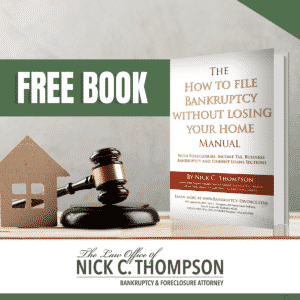Some people file their bankruptcy without an experienced attorney because they feel they cannot afford the attorney fees.
Nothing could be more untrue and costly to your bankruptcy outcome than filing without an attorney or using bad, inexperienced attorneys. In California, about 90% of the pro-se Chapter 13 cases are dismissed and we all cost the same
A filing fee can be paid in installments
This often causes a case to be dismissed. Don’t pay the filing fee upfront, and you put clerks through added work. Judges will presume you are wasting their time and have no intent of filing in good faith. Pay late, your case is dismissed.
A credit counseling fee can be waived if a debtor is poor. However, the bankruptcy petition will be dismissed and bankruptcy code may cause properly loss if the petition is not prepared properly.
Chapter 13 bankruptcy has a no look fee
No-look fees are a flat fee paid in Chapter 13 cases. It is presumed an experienced bankruptcy lawyer has at least that much work. A higher fee can be allowed based on hourly fees which in 2024 run from 250 to 350 per hour. A bankruptcy lawyer often has to wait 4-5 years to be paid the no-look fee typically 100 – 200 a month until paid. Courts don’t pay if the plan fails
Attorneys Fees Filing fees
As of 2024, attorneys fees in a Western Kentucky Chapter 13 bankruptcy case are paid a flat fee of $4,100 by the court in the Western District of Kentucky. In Southern Indiana, no look fees are $4,500; in Eastern Kentucky, flat fees are $4,000. Most offices now charge in 2024 1400 for a single uncontested Chapter 7 and 1600 for a joint uncontested petition or more plus the filing fee. Total fee 1738 and 1938 plus the credit counseling class of about 20-50 dollars. If you shop for a low-cost Chapter 13 attorney, you get one with less experience and knowledge and pay unsecureds more. Filing fees are 338 for a Chapter 7 bankruptcy and 313 plus postage for a Chapter 13.
Expenses costs
The Chapter 13 Court first pays attorney fees and court expenses as administrative claims. Then priority debts such as income taxes under 3 years old, alimony, and child support are paid. Then secured creditors such as your home mortgage and car loan are paid. Unsecured debts are paid last.
Hourly fee flat fees
Hiring an experienced lawyer, gets you an attorney with experience. It doesn’t increase your flat fee or your plan payments. You just get better advice. If you file your own Chapter 13, you typically pay the creditors more. Here’s how it works. Your plan payments must pay what Chapter 7 bankruptcy would have repaid. It must repay the priority and secured claims and must repay any disposable income.
Money paid into the lawyers trust fund pays the filing fees and makes the first payments into the plan, showing you actually have the intention of paying. Respected local attorneys connect better with judges than you will.
Do You Think You Can’t Afford a Chapter 13 Attorney

The order of payout.
Claims are paid in the following order:
- Administrative claims: Trustee, lawyer fees, and court costs.
- Priority claims: Taxes less than three years old, alimony, and child support claims.
- Secured claims: Car and home loans and mortgages. (Normally, second auto, boat, motorcycle, and four-wheelers are viewed as a luxury and not allowed, but small balances may be allowed.)
- Unsecured debt: Student loans are not normally dischargeable, but they are unsecured claims — not priority claims. In Chapter 13, they are paid last, which requires special planning. (Medical bills and credit cards are also unsecured claims.)
If you file Chapter 13 on your own, know this. Poor and incomplete petitions cause bankruptcy debtors to lose money and property or spend additional stressful time in court. You have to pay the credit counseling fee and filing fee but debt relief planning and excellent attorneys eliminate unsecured debt.
What you need to know to file Chapter 13 bankruptcy effectively.
How do you properly file exemptions to keep property you own, or compute the means test? 1000 other rules are what you need to know to prepare a good Chapter 13 bankruptcy. The Bankruptcy Code is a complicated federal statute. The 2020 Thompson version is over 1600 pages. Chapter 13 Bankruptcy involves technical terms, accounting principles, and rules of law a non-bankruptcy law firm has trouble understanding. It refers to other codes, such as the IRS code, in determining whether student loans and income taxes can be discharged.
Bankruptcy law firm and debt relief history
In 2006 most attorneys who were filing bankruptcy cases quit because it became so complicated. Since 2005, it has become even more difficult. So, if attorneys can’t typically file Chapter 13 bankruptcy petitions, why do some people think they can use a cheap attorney or file a petition themselves? Sure, some people do it. But you are taking a huge chance if you have assets or have filed repeatedly or after transferring property.
The Chapter 7 bankruptcy filing
Do you know that the job of a Chapter 7 Trustee is to take your property away? He represents creditors, not you. This is the snare those who file their own bankruptcies fall into. Pro se Debtors look to him for advice. He doesn’t work for you he works for the maximum he can take.
Unfortunately, when a debtor prepares their own Chapter 7 case, it often unravels. If the property was not properly mortgaged, it can belong to the trustee. That’s when the Trustee just smiles while he takes the property of a debtor who didn’t use an attorney to check whether or not the mortgage or car lien was properly filed.
Paralegals don’t give advice.
A paralegal is not supposed to offer legal advise. Offering advice is practicing law without a license. A paralegal only works under the supervision of an attorney. Experienced bankruptcy attorneys review the debtor’s financial file fully before filing and often have CPA training, a finance degree plus a law degree.
He then obtains documents to ensure security interests are properly filed and that the property did not improperly transfer. The junior attorney is supposed to work underneath a more experienced attorney. However, in a bankruptcy mill, they rarely check, or the head of the law firm doesn’t spend time with you checking that your goals are being met.
A good attorney is worth the bankruptcy fees!
A good bankruptcy attorney doesn’t always meet every client’s demands. You probably won’t get a free home. But, a good bankruptcy attorney advises you and warns you about potential problems like the possible loss of a home. That’s in addition to outlining in detail the steps you should take to get benefits less experienced attorneys miss.
It’s worth the time and money to have an attorney with experience help you plan. Some Debtors hire a cheap bankruptcy lawyer. But, it often costs a lot more work, time, and property. The simple fact is you can’t afford to file by yourself. No one can.
Instead, always hire the best, most experienced attorney you can find, especially in Chapter 13.



